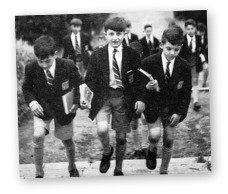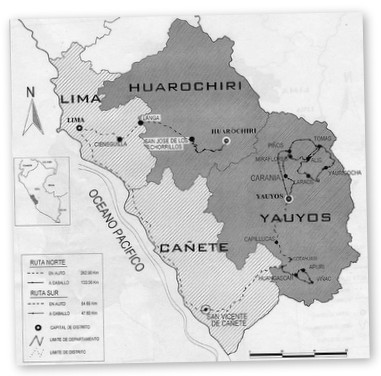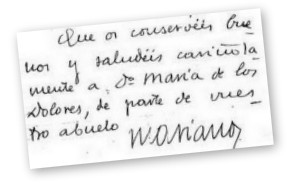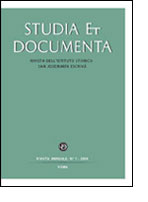The fourth issue of the historical journal Studia et Documenta is published

The fourth issue of Studia et Documenta (2010), a yearly publication dedicated to the history of Opus Dei and its founder, St. Josemaría Escrivá de Balaguer, has just come out.
As is customary, the journal devotes part of its contents to a specific subject, which in the present case examines various initiatives promoted by members of Opus Dei in the educational field, in different places and circumstances. Mercedes Montero looks at the beginnings of the first residence for women promoted by St. Josemaría: the Zurbarán Residence in Madrid. Constantino Ánchel, using the documentation available, embarks upon a study of the first corporate
apostolate endeavor of Opus Dei: the DYA Residence. And Ramón Pomar examines another reality that has had far reaching consequences, a reality that has inspired many similar initiatives around the world: Gaztelueta School.
There is also something of the pioneer, although in a different sense, in the content of the article composed by José Manuel Cerda dedicated to Warrane College, in Sydney. It was the first apostolic undertaking on Australian soil and almost immediately found itself in the thick of the student protests of the 70s. As Maria Carla Giammarco writes in the introduction to the featured section, “the onrush of opposition to the Christian apostolic initiatives is a daily occurrence and is almost ritual, nevertheless the case of Sydney, with the attacks, the barricades and the throwing of homemade missiles, has a spectacular attraction, something of the epic western».
In the Studies and Notes section, there are two articles about the relationship between St. Josemaría and leading figures from the history of the Church. The first article is dedicated to the correspondence between the founder of Opus Dei and Msgr. Juan Hervás Benet, promoter of the Cursillos de Cristiandad (Cursillos in Christianity); the author, Francisca Colomer, reveals the friendship shared by two great promoters of the spiritual life of the laity. In the other article, Aldo Capucci analyzes the relationship between St. Josemaría and Blessed Ildefonso Schuster, cardinal archbishop of Milan, a leading member of the Church in contemporary Italy. 
This section, which includes miscellaneous articles, contains other studies that take us to opposite parts of the globe, places far apart in cultural terms: the prestigious University of Harvard and the indomitable Andean region of the Prelature of Yauyos. In very different ways, but with the same apostolic spirit, members of Opus Dei have worked to bring the Gospel to these places. John A. Gueguen continues a study embarked on earlier about the beginnings of Opus Dei in Cambridge (U.S.A.), which was published in the first edition of Studia et Documenta. Meanwhile, Esteban Puig writes about the Prelature of Yauyos –entrusted to Opus Dei by the Holy See – and its influence on the development of clergy in Peru.
The section Studies and Notes is completed by the biographical annotations of Francisca R. Quiroga about Narcisa (Nisa) González Guzmán, one of the first woman members of Opus Dei.
 Next we turn to the Documents section; new documents with appropriate introductions and notes are published in this section. In the current edition we have two collections of letters: the first collection is the correspondence between St. Josemaría and Dolores Fisac (also one of the first woman members of Opus Dei) during the Spanish Civil War which apart from its biographical interest is a fragment of the daily life of war refugees in hiding. Yolanda Cagigas has responsibility for editing the correspondence. The second collection –presented by Francisco Crosas– covers the epistolar relationship between the founder of Opus Dei and the Bishop of Vitoria Msgr. Javier Lauzurica, during the years 1934-1940: this documentation is most interesting not just for the history of Opus Dei, but also for the Church in those eventful years in the life of Spain.
Next we turn to the Documents section; new documents with appropriate introductions and notes are published in this section. In the current edition we have two collections of letters: the first collection is the correspondence between St. Josemaría and Dolores Fisac (also one of the first woman members of Opus Dei) during the Spanish Civil War which apart from its biographical interest is a fragment of the daily life of war refugees in hiding. Yolanda Cagigas has responsibility for editing the correspondence. The second collection –presented by Francisco Crosas– covers the epistolar relationship between the founder of Opus Dei and the Bishop of Vitoria Msgr. Javier Lauzurica, during the years 1934-1940: this documentation is most interesting not just for the history of Opus Dei, but also for the Church in those eventful years in the life of Spain.
The Features (Chronicles) section is dedicated in this edition to a presentation of the phenomenon of the popular acceptance of the memory of St. Josemaría in Italian urban space: the author, Aldo Capucci, reports on the considerable number of streets, squares, etc, which are dedicated to the founder of Opus Dei in Italian cities and towns.
 This issue also offers a bibliographic section with reviews and write-ups, and a new installment of the already monumental bibliographical list dedicated to the “General Bibliography” on St. Josemaría and Opus Dei. The first three issues of Studia et Documenta have tried to provide an exhaustive bibliography on St. Josemaría up as far as 2002, while the fourth issue offers the first installment of the “General Bibliography on Opus Dei”, which will continue in future editions.
This issue also offers a bibliographic section with reviews and write-ups, and a new installment of the already monumental bibliographical list dedicated to the “General Bibliography” on St. Josemaría and Opus Dei. The first three issues of Studia et Documenta have tried to provide an exhaustive bibliography on St. Josemaría up as far as 2002, while the fourth issue offers the first installment of the “General Bibliography on Opus Dei”, which will continue in future editions.
See the summary and abstracts of vol. 4- 2010



